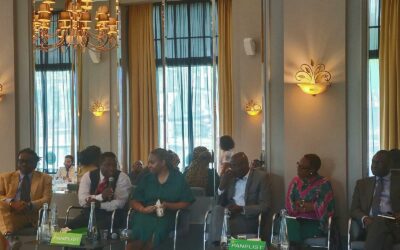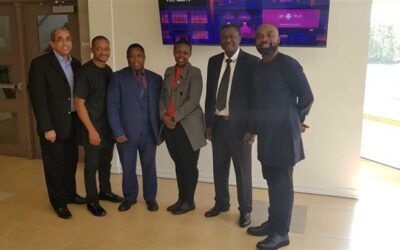What would you do with 5 more dollars?
Mme Henriette HOP, nicknamed “Maman”, manages an orphanage in Matomb, Cameroon.
She raises her eyebrows, repeating: “With 3000 CFA? Why of course…”. She’s even smiling; the answer seems so evident to her.
To meet up with her in Matomb, we had to drive for hours under pouring rain on the axis linking Yaounde to Douala. As luck would have it, the weather was back to clear at our arrival. After the incessant drumming of rain on the roof of the car and swaying of the windshield wipers, the soft song of the night birds and chirping of crickets was enchanting.
“Starting an orphanage was my husband’s wish…”
In memory of her late husband, and supported by her daughter living in France, Maman built the orphanage of her own hands. The ONG Chiala[1], with the support of ADEPT, installed a filtration system for borehole water, making it drinkable and bringing it up to norms. While the water technician proceeds with upkeep of the system, I talk with Maman about the viability of the orphanage.
“My daughter sends what she can, and when I take my retirement pension, I also [do my part, editor’s note]. Besides that, I grow crops, I work in the fields. I grow cocoyam, cassava […] I grow corn, I grow peanuts, anything we can eat really!”
This woman in her sixties explains her strategy to me because the orphanage does not benefit from any governmental funds: producing as much as she can of what the orphans, personnel, and herself consume every month. The money is then used to pay the two youths who support Maman, to complete meals, to pay for the children’s educational budget, and to manage unexpected health expenditures. The orphanage has also suffered the consequences of the COVID-19 confinement as to curb cases during the second trimester of 2020.
“[There has been] a diminution of [transfers]. [My daughter] was extremely saddened by it. We waited for measures to be lifted in the bank, there were no more transactions. I was fighting with what little I received at the end of the month.”
When asked about the transfers she receives from France, she reminds that transaction rates in Africa are the highest in the world.
“Through Western Union, MoneyGram… if [my daughter] sends 90 euros, it gets charged about 4.50 euros. That’s why we don’t use it anymore; because the bank transfers cost more.”
The low end of transaction fees in Africa is of about 5%, usually being closer to 9%. Countries have come to an agreement through the Sustainable Development Goals[2], and most notably to reduce the aforementioned transaction costs to less than 3% by 2030[3]. Digitalisation of bank transfers is the technological solution to such a big reduction, meaning the extra money can finally be used by families. What would such a reduction be able to offer to a family?
“Maman, with 3000 FCFA, what more would you buy for the orphanage?”
As I asked, her eyes widened, her ears perked up, her interest becoming evident.
“With 3000 FCFA? Why, that gives us food for nearly a week!”
It’s my turn to repeat now:
“With 3000 FCFA?”
This makes her smile and laugh at my question. She shrugs.
“Well yes, of course, since we’ll go buy […] To go to the market, we don’t buy everything the same day. We have a little bit of stock, some sides, maybe we need to go get fish. 3000 FCFA to go get fish, we can eat for 5 days with that! You see?”
She confirms to me that the transaction costs could have been used to buy protein for nearly a week. This confirms to me the idea that reducing costs means a few extra days of food for millions of families. Advocating for the completion of this SDG means supporting 1 Billion families. You can show your support simply by sharing the story.
And by the way, what would you do with 5 more dollars?
To support Mme Hop aka Maman,
Our position
ADEPT has joined the Remittance Community Task Force[4] and has answered to the Call to action: “Remittances in crisis: how to keep them flowing “started by Switzerland and the United Kingdom, respectively demanding for the transfer costs to be reduced and for the obstacles disrupting their flow to be lifted.
[1] https://chiala.at/en/
[3] https://sdgs.un.org/goals/goal10 notably 10.c.1
[4] https://familyremittances.org/idfr-2020/the-remittance-community-task-force/





